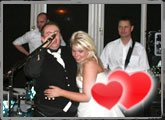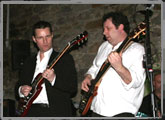Looking to form a live covers band to play in clubs and at weddings? This is the story of how Scottish four man band BIG Tuna got its act together. Drummer Bill Shaw writes.
Back in 2003 I was looking for a fresh challenge in life. I wasn’t exactly idle at the time, working as an account director for a thriving PR agency and bringing up two young children, but had a desire to do something just for me.
I had been separated for two years and was enjoying the inevitable re-living of my youth but I really felt I should be doing more with my limited spare time than chasing women. Playing sport had always been a great hobby of mine but that option was closed due to a bad knee injury playing five-a-side football a year earlier. While I couldn’t run about like a teenager any longer, I realised that I could still keep a rhythm and decided it was high time I revived my passion for playing the drums, a pastime which had lie dormant since the mid-eighties when I’d played in a couple of ill-fated basement bands in my native Canada. Nearly 20 years on, I now decided that, once again, I wanted to be in a band.
I was fortunate in that two of my work colleagues played guitar and even more fortunate to find that (a) they were also keen to be in a band, (b) they were both very good guitarists and (c) they could both sing. So that was the basis of forming our covers band. After a few false dawns we managed to find a bass player from an on-line forum. We were looking for a like-minded individual who wanted to be in our Scottish covers band, we found our man and Big Tuna was born.
We all saved our money and invested in decent gear and also managed to find a very cheap PA system at a pawn shop which last us for over a year when we’d made enough money to afford a newer and more powerful system. Getting the gigs was my job. I did a web search for venues in Edinburgh and across Scotland looking for cover bands and also asked around the music community who were happy to share some recommendations. The band recorded a demo CD with four cover songs on it and I started punting it round my target list. You need to be thorough when dealing with venues as some of them will mess you around for weeks and months before they make a decision. You must not lose your patience with managers and owners or you could burn bridges. I found the best approach is often to turn up at the venue with our demo and actually speak face to face with the manager. As the band progressed and we started making videos or our performances, I would sometimes turn up with a laptop to play them a few clips so they could not only hear but also see just how good we were.
Scotland and, in particular, Edinburgh has a decent live music scene although opportunities are limited for cover bands. We felt that after six months of hard practice we’d make our mark and set out to establish ourselves as a top Scottish covers band. We played our first gig in a small pub in rural Fife and managed to pull a good crowd, mainly because we got friends and colleagues to come along. It’s a bit chicken and egg for a live covers band; once you play a few gigs you tend to get booked for more. When you are playing in a covers band you need to think long term and be prepared to play for free, especially when starting out. While we did get paid for our first gig, we did subsequently agree to play a few freebies in other venues to prove that we could deliver the goods. We also play a few charity gigs each year which is good to do for many reasons: you are supporting a good cause and these gigs tend to be well attended which gets you exposure to a wider audience.
It has taken a lot of graft to get to establish ourselves as a top Scottish covers band, probably three years of constant gigging at pubs and clubs to build a name for ourselves. Sometimes crowds were tiny – on more than one occasion we have played to little more than a few bar staff. However, through time we have been able to get a bit more selective about where we perform and now usually stick with the venues which have a decent atmosphere and usually attract a good crowd.
After a few years of building our reputation as a live covers band in a range of venues around Scotland, we were one day asked to play a wedding. This was a shock – we never saw ourselves as a wedding band because we tended to play more hard rock covers. However, after speaking in more detail with the bride to be, we realised there was an opportunity to market ourselves as a wedding band with a difference; one that didn’t play the usual Huey Lewis and Mariah Carey songs. It seemed that some couples like a bit of rock music played on their big day and that was great news for a band like us. That said, you need to be more inclusive as a wedding band as Jimi Hendrix and Muse songs don’t always gone down well with the grandparents and great aunties. We decided to go back into our rehearsal studio and learn some slightly less heavy tunes – without compromising the band’s rock sound. We believe we got the balance right and, judging from the many weddings we are now playing (eight bookings already for this year), so do the people who book us.
Being in a covers band, playing Scottish towns and cities can be a little unpredictable but the important thing is that we always enjoy ourselves and that enthusiasm rubs off on the crowd. Big Tuna has been a big success in relative terms (we often describe ourselves as Scotland’s least ambitious covers band). We play an average of two gigs a month which is the right balance for us given we all have busy family lives. We have undoubtedly played a few dubious venues but we have also established ourselves as regulars at some great nightspots in Edinburgh and across East Central Scotland. Our biggest gig to date was at the Royal Highland Show in Edinburgh in 2009 where we played to over 2000 people.
It took a fair bit of sweat and toil to get to our current repertoire of around 80 songs – a decent one for a covers band – but we have enjoyed every minute of it. We play for the love of gigging, not the money, but the extra cash has certainly been a bonus. Getting paid anything for doing something you love gives you a great sense of pride because it means people value what you do.
This Spring Big Tuna will celebrate its seventh anniversary with no changes in our line-up since our bass player joined in 2004. Playing live covers at Scottish clubs and performing at weddings has certainly fulfilled my own need from many years ago to find a fresh challenge. With all four of us continuing to enjoy every minute of the live band experience, this is a passion that should carry on for us well into the future.




By shred guitar videos March 21, 2010 - 2:56 am
Very nice post. I just stopped by by your website and wanted to say that I have truly enjoyed checking your posts. Any way, I’ll be subscribing to your feed and also I’m hoping you post again soon!
By Geoffrey Maraldo April 14, 2010 - 8:07 pm
Wow, many thanks a bunch m8